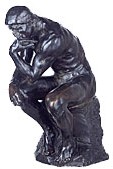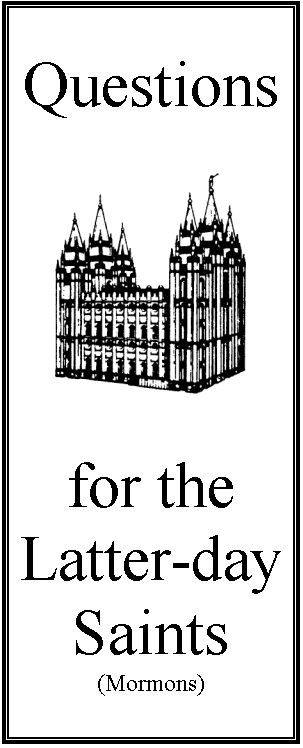5. Why did a “furious” wind move the Jaredite barges at merely 1 mph., and take 344 days to get to America (Ether 6:5, 11)?
6. If you have a “testimony” of the truth of the Book of Mormon, how do you know it is not from a “seducing spirit” (1 Timothy 4:1)? Would not a “seducing spirit” be seductive, or in other words, feel good, even wonderful?
—Why rely on a subjective test when the Biblical tests of truth claims were always objective?
—Aren’t the scriptures “the accepted standards of measurement” according to Joseph Fielding Smith in DS, vol. 1, p. 188, (quoted above)?
7. Do you know that the Muslim holy book, the Koran, is not scripture?
—What is the reason that you know it is not true? Have you read it and asked God sincerely, with real intent, whether it is true, or not?
—Is it not true because it teaches doctrines you know are not true?
—Isn’t that why the Book of Mormon should be tested by the same criteria, the “accepted standards of measurement,” the scriptures? (See Isaiah 8:20.)
8. Where was Jesus born, Bethlehem, or Jerusalem? (See Micah 5:2 and Alma 7:10.)
9. Have you compared Jacob 4:1 with 4 Nephi 1:6?
Concerning Joseph Smith:
10. Why did Joseph Smith boast of doing a greater work than Jesus (History of the Church [HC], vol. 6, pp. 408–409)?
—According to Mormon Apostle Bruce R. McConkie in Mormon Doctrine [MD], pp. 93–94, was this boasting righteous, or in the arm of flesh?
11. If Mr. McConkie was correct, that a martyr voluntarily surrenders his life, was Joseph Smith a martyr if he shot back at his assailants (HC, vol. 6, pp. 618, 620; vol.7, p. 102)?
12. Why does Mormonism persecute Baptists, Methodists, and Presbyterians by telling them their churches are “all wrong,” and that their creeds are an “abomination” in the sight of God (Pearl of Great Price [PGP], Joseph Smith—History, 1:9, 19)?
13. Who did Joseph Smith see in his First Vision according to Brigham Young in the Journal of Discourses [JD], vol. 2, p. 171?
14. Why was no temple built in Jackson County, Missouri, when Joseph Smith prophesied one would be built “in this generation” (D&C 84:1, 4–5, 31; JD, vol.17, p. 111)?
—How is one to discern between true and false prophets (Deut. 13:1–5 and 18:20–22)?
15. Why did Joseph Smith drink wine (HC, vols. 4:120; 5:380; 6:616; 7:101; cf. also vol. 2:524 with vol. 4:483)? Would Joseph Smith, a wine drinker, be given a temple recommend today?
Concerning Authority:
16. According to Abraham 1:26–27, were those who had the blood of Cain and Ham cursed from holding the priesthood?
—How can a Mormon man hold the Melchizedek priesthood if he is of the tribe of Ephraim or Manasseh, since they were children of an Egyptian mother, a descendant of Ham (Genesis 41:45, 50–52; Abraham 1:21–27)?
Concerning God:
17. Are the appearances of God “face to face,” etc., in the Old Testament actually proof that God has a physical body? Who was it that dealt directly with man after the Fall, Elohim (the Father), or Jehovah (Jesus)? If it was Jehovah (Jesus) how could He have appeared in his physical body when He had not yet been born in Bethlehem?
18. If the understanding of the Lord is infinite (Ps. 147:5), and He knows of no other God (Isa. 44:8), then can there be any other God? If there are other Gods, and the glory of God is intelligence, why did God say He was unaware of any other Gods besides Himself (Isa. 43:10, 11; 44:6–8; 45:5, 6, 18, 21–22; 46:9; PGP, Moses 1: 6)?
19. Is God unchangeable, or eternally progressing (Moroni 8:18; 3 Nephi 24:6; Mormon 9:9–12,19)?
20. Wasn’t Lucifer cast out of heaven for desiring to be “like the Most High” (Isaiah 14:14, 2 Nephi 24:14)?
—Aren’t Mormons seeking to be like the Most High, Elohim, Gods over their own worlds?
—If Mormons are seeking the same thing that caused Lucifer to fall, then will they not also suffer the same judgment (Matthew 25:41; Isa. 14:15; 1 Nephi 14:3; and 2 Nephi 24:15)?
—Did God say He was a man, or not a man, in these scriptures (Numbers 23:19; 1 Samuel 15:29; Hosea 11:9)?
—Don’t these scriptures teach that God was always God, eternally, and therefore He could never have progressed to Godhood from being a man (Moroni 7:22; 8:18; Mosiah 3:5; and Psalm 90:2)?
Concerning Scripture Accuracy:
21. Was David’s and Solomon’s polygamy an abomination in God’s sight (Jacob 2:23, 24), or Did God give them their wives (D&C 132:38–39)?
22. Was Enoch 430 years old when he was translated (D&C 107:49)?
—Or, was Enoch 365 years old when he was translated (Teachings of the Prophet Joseph Smith, p. 170, and Genesis 5:21–23)?
23. Did David Patten go on a mission over the great waters with the rest of The Twelve in the spring of 1839 (D&C, 114:1; 118:1–5) or was he killed in the fall of 1838 (HC, vol. 3, p. 171)?
Concerning Mormon Doctrines:
24. In the Law of Eternal Progression can one progress beyond one’s spouse if one’s spouse is a nominal, or, “Jack” Mormon?
—Must Mormons married to non-Mormons convert their spouses, or divorce them and marry a temple-worthy Church member to be exalted in the Celestial Kingdom?
25. Is murder a sin that is covered by the blood of Christ, or must one’s own blood be shed to atone for murder (Doctrines of Salvation, vol. 1, pp. 133–135)? How was David forgiven for the murder of Uriah (2 Sam. 12:9–13)? How did Moses, who had killed an Egyptian in a quarrel, become God’s great Law-giver?
—What sins does John say are not covered by the blood of Jesus Christ, in 1 John 1:7?
26. Why does the New Testament condemn seeking after genealogies (1 Timothy 1:4 and Titus 3:9)?
27. In the Preface to his book, Spirit World Manifestations, Mormon author Joseph Heinerman states that “...the inhabitants of the spirit world have received permission to visit their mortal descendants...” and, “...spirit world manifestations and angelic appearances have played and continue to play a major role in the upbuilding of God’s Kingdom in these latter days.” Does this accurately represent Mormon beliefs? Isn’t this also spiritism, and necromancy (Deuteronomy 18:10 –12)?
28. Why does Paul use the word “they” when talking about baptism for the dead instead of “we” or ‘you” at 1 Corinthians 15:29? What other reference to this doctrine is there in the Bible or Book of Mormon?
29. Was Jesus born of a Virgin, or did God the Father have sex with Mary (cf. Matthew 1: 18–25 with MD, pp. 546, 547, 742; JD, vol.4, p. 218; vol. 8, pp. 115, 211)?
—If Mary is one of the spirit children of God the Father, and He fathered her child, would not He be guilty of incest? Is this teaching offensive to you? To whom should you complain? The one who asked this question, or the one who teaches the doctrine?
30. Can a deacon be a 12-year-old boy (1 Timothy 3:8-12)?
An Invitation:
Mormonism’s gospel is a vast system of laws and ordinances (Answers To GospelOuestions, vol. 3, pp. 26, 27), which are impossible to obey perfectly. The purpose of this system is to exalt man to godhood.
In Christianity, the gospel is the good news that God became a man, who not only absorbed the full penalty of our sin in Himself, but also provided for us the perfect righteousness God required to make us right with Himself. We are sinners by nature deserving God’s wrath, and all our works, even our very best, are still tainted with sin and utterly useless toward salvation. If we will confess that, and, putting zero confidence in ourselves or our own works, turn from them altogether (repentance of sin) and put our sole and entire trust on Christ alone to save us from our sin (saving faith), then He promises to save us to the uttermost (Heb. 7:25).
Both His death and perfect life of righteousness are imputed, credited, to our account. By His death He paid the penalty due us for our sin, thus canceling the debt. By His righteousness He supplies for us everything we need, everything God requires, for us to have a positive, right standing before God. Moreover, He sends the Holy Spirit to empower us to live victorious over sin.
Have you have ever submitted yourself to God in this way—confessing your total inability to even contribute toward your own salvation, and relying entirely on Him alone to save you? Jesus said, “All that the Father gives me shall come to Me, and the one who comes to Me I will certainly not cast out” (John 6:37). If you are still trusting in yourself or your own efforts to somehow work together with Jesus’ work, to win eternal life with God, then you simply have not truly come to Jesus. He wants all your trust. You must come to Him on His terms—you must put all your trust on Him alone—and He will not cast you out, but receive you to Himself. Why not do it now?
If you want further information on these and other topics write to the author or revisor of this tract. Your name will be held in complete confidentiality.
DWH TEOGo to top of page.

